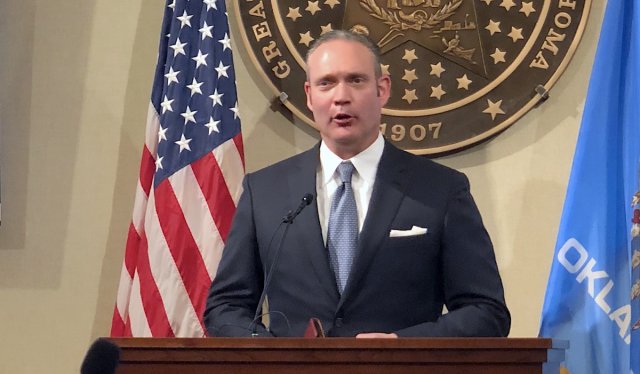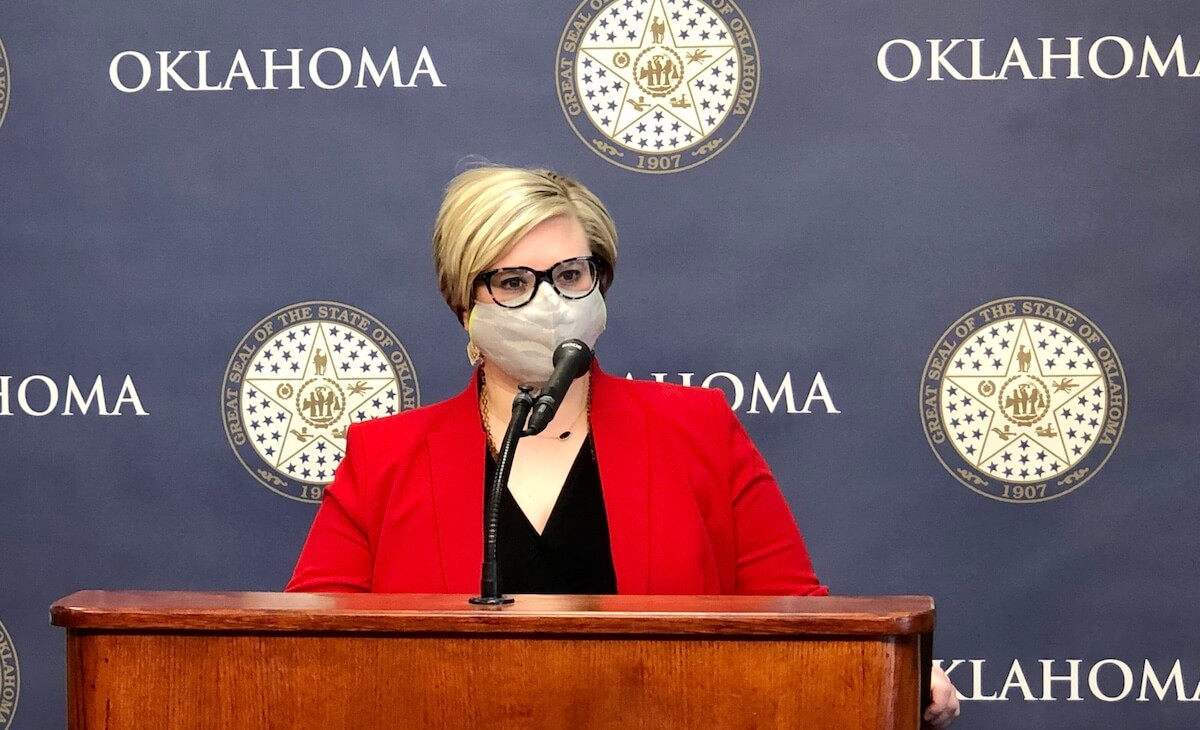
House Speaker Charles McCall may have voted for the largest tax increase in state history three years ago, but with state revenues looking promising he believes the 2021 legislative session could be the right “opportunity” to mold Oklahoma’s tax policies to be more like those in Texas in an effort to compete for business relocations on a national level.
In separate interviews with NonDoc and other media this afternoon, McCall (R-Atoka) answered questions about his new bill to eliminate the state’s corporate income tax over five years and a still-developing proposal to reduce Oklahomans’ income tax burdens by potentially .25 percent.
“I think there’s an opportunity this session to at least start a dialogue,” McCall said.
That dialogue began today with the House Rules Committee advancing McCall’s HB 2083 7-2 on a party-line vote. The bill would phase out the state’s corporate income tax rate over a five-year period by granting tax credits, an intentional mechanism aimed at avoiding a three-fourths majority vote in the future if the policy needs to be reversed in worse economic times.
“I think by eliminating it, over time it actually gives us the opportunity to replace it fairly quickly with new investments in the state of Oklahoma,” McCall said.
House Minority Leader Emily Virgin (D-Norman) voted against HB 2083 in committee and channeled her best Bill Murray from Groundhog Day.
“I’ve been here before. I’ve heard this story before, and I am disappointed that they’re trying it again,” Virgin said. “We know that we’re not in a place yet where we need to be cutting taxes for corporations.”
Corporate income taxes, however, play a relatively modest and “very volatile” role in funding Oklahoma state government, ranging from less than $100 million in some years to about $500 million after banner economic years. McCall estimated that his five-year phase out proposal would drop state collections by about $64 million per annum.
“It’s such a small impact as well to the budget,” he said. “The negative optics of [Oklahoma collecting this tax while Texas does not] outweigh the benefit of it.”
‘The state south of us’
As CEO and chairman of the board for his family’s AmeriState Bank, McCall would sort of know.
“Our family with its company, we have a branch south of the Red River too, so we get a pretty good look at what the environment is in the state south of us,” McCall said.
The McCalls’ bank, however, is set up as an S Corporation, which does not pay corporate taxes and instead passes the tax burden to its shareholders, thus avoiding the functional “double taxation” incumbent upon a C Corporation. In Oklahoma currently, a C Corporation pays a 6 percent corporate income tax on its net income, with distributions taxable again at the shareholder level.
“There’s going to be a certain amount of C corporations, and when they look about going to a state, they look to see if there is a corporate taxation on their entity,” McCall said. “In Texas, there is not. In Oklahoma, it is 6 percent.”
The idea has been pitched before, memorably by Gov. Mary Fallin in her 2017 State of the State address that contained various proposals to reform the state tax code. That effort never left the launch pad, and two special sessions later a McCall-led House of Representatives made history by patching together more than 76 votes for a package of revenue raising measures that pumped about $450 million in new revenue into the state’s blistered and bandaged budget.
Virgin finds the idea of eliminating about $300 million in corporate income taxes “disappointing” only three sessions later.
“I’m very concerned about the $64 million fiscal impact this bill would have,” she said. “We’re essentially saying we don’t need this money to go to core services, that it’s going back to corporations instead of going to make core services whole again.”

Individual income tax reduction ‘more challenging’
Like McCall, Gov. Kevin Stitt has experience with corporations, though his mortgage empire-turned bank has been walled off from his influence during his gubernatorial tenure.
Still, Stitt likes McCall’s tax cut proposals.
“From the beginning I’ve said we need more taxpayers, not more taxes,” Stitt said in a statement provided to NonDoc. “Lowering taxes on Oklahoma families and businesses continues our push to make Oklahoma a Top 10 state and make it even more attractive for companies to bring more jobs and grow and diversify our economy.”
McCall’s second tax cut concept may sound even more familiar to state policy wonks: lowering the individual income tax in an effort to let Oklahomans retain more of their earnings and perhaps compete a little more effectively with Texas, which has zero personal income tax (but significantly higher property taxes).
But how McCall’s HB 2041 — still a shell bill for now — would actually trim individual income tax burdens remains to be seen. All the third-term speaker could say today is that HB 2041 would likely implement tax credits as well in an effort to avoid directly cutting the income tax rate, which would be nearly impossible to restore when state finances take their inevitable dip downward on the revenue rollercoaster.
“We’re looking at the modeling. We haven’t found the modeling that we like yet. You can run one variable in a model, and it will affect people differently because of all the deductions we have with all the caps and credits,” McCall said. “We find the individual side more challenging because, really, our entire tax code there needs to be overhauled and modernized.”
Virgin could agree with overhauling and modernizing, but she would like to see such an effort benefit the least among us and not the wealthiest.
“I have specifically asked for the (reinstatement of the) refundability of the Earned Income Tax Credit, and I’ve asked that if we are going to make any changes to the income tax structure that we target that tax relief to those who truly need it and not those who are doing just fine,” Virgin said.
McCall called the topic “very convoluted,” but he said he believes the state’s top individual income tax rate needs to be below its current 5 percent mark. He said he did not believe HB 2041 would include more than a 0.25 percent offset, however.
“We believe we can grow the economy where we continue to grow revenue at lower levels of taxation for the people of the state,” McCall said. “We’re often overlooked because the initial profile for business and highly educated people are just not competitive.”
Virgin said that where Oklahoma struggles from a competitive standpoint is in regard to education funding, education outcomes and health care access.
“What I’m hearing from businesses is that when they are looking at relocating to Oklahoma, they are very concerned about quality of life issues and our outcomes in terms of education and health care also being low,” she said. “I think it’s less about corporate tax structure and more about an attractive environment for their employees to live in.”
McCall employed a retail metaphor in challenging that assessment.
“You have to continue to make those investments to address those issues,” he said. “But once again, if you’re not competitive, the front of the store doesn’t look attractive, nobody is coming in to see what you have.”
Treat says ‘serious conversation’ needed
Asked about McCall’s proposals on the afternoon of Monday, March 1, Senate President Pro Tempore Greg Treat (R-OKC) said the Senate Republican Caucus had not yet taken a position on the tax issues. Asked his opinion as an individual senator who served during the 2017-2018 debate over raising state revenue, Treat had more to say.
“It’s not an insignificant amount of money, so we need to have a serious conversation about the merits of his proposal,” Treat said. “We need to have a conversation, and we have not had that yet.”
(Update: This article was updated at 1:35 p.m. Monday, March 1, to include Treat’s comments.)





















